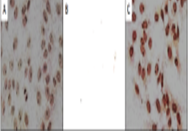Abstract
Cancer is unchecked growth of normal cells. The screening of new potential agents is vital to develop effective cytotoxic drugs with reduced side effects. Thecytotoxic effects, mode of cell death and screening of phytochemicals which induced cell death by the mangrove plant Xylocarpus granatum extract on the human hepatocellular carcinoma cell line was studied. The crude methanol extract of Xylocarpusgranatum(bark) partitioning produced the high yield in diethyl ether (54.08%)followed by butanol (37.12%) and aqueous (3.21%).The Xylocarpus granatum bark extract produced a cytotoxic effect with IC50 <30 µg/ml as compared to leaf and root (IC50> 100 µg/ml). The DNA fragmentation study done to determine the mode of cell death. The results attained by the colorimetric TUNEL system propose that Xylocarpus moluccensis extract induced DNA fragmentation in the HepG2 cell line. The darkly stained nuclei observed in HepG2cells treated with Xylocarpus moluccensis(diethyl ether) extract for 24 hours. The DNA fragmentation indicating that apoptosis was the mode of cell death on HepG2 cell line. Furthermore, The Xylocarpus moluccensis(diethyl ether) extracts phytochemical study confirms the presence of flavonoid, steroid, terpenoid, phenols, tannins, glycoside, and saponin.Thus, the further study of potential phytochemicals need to done in order to confirm these phytochemicals as a future therapeutic agent for the treatment of cancer.
Full text article
Authors

This work is licensed under a Creative Commons Attribution-NonCommercial-NoDerivatives 4.0 International License.

